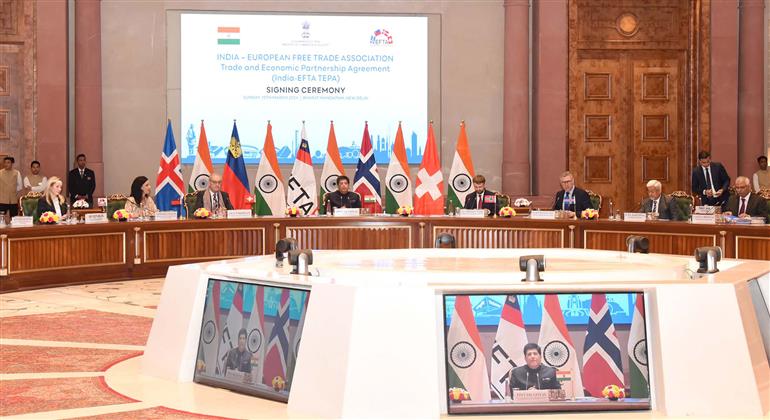India Signs Historic Trade Agreement with EFTA, Unlocking multi Billion Investment and one Million Jobs
India Signs Historic Trade Agreement with EFTA, Unlocking $100 Billion Investment and 1 Million Jobs
India and the European Free Trade Association (EFTA) have officially sealed a Trade and Economic Partnership Agreement (TEPA) on 10th March 2024, marking a significant milestone in international trade relations. This partnership encompasses the EFTA member countries of Switzerland, Iceland, Norway, and Liechtenstein, with the Union Cabinet, led by the Prime Minister, endorsing the agreement. EFTA, established in 1960, aims to foster free trade and economic integration to benefit its members.
Piyush Goyal, Minister of Commerce and Industry, Food and Consumer Affairs, and Textiles, described the TEPA as a modern and ambitious agreement, noting it as India's first Free Trade Agreement (FTA) with four developed nations. This agreement is notable for its binding commitment to attract $100 billion in investment and create 1 million direct jobs in India over the next 15 years, expected to significantly boost the Make in India initiative and offer vast opportunities to India's skilled workforce.
The TEPA spans 14 chapters, focusing on various sectors including market access for goods, trade facilitation, sanitary and phytosanitary measures, and intellectual property rights. It emphasizes the promotion of investments aimed at increasing foreign direct investment stock by $100 billion in India, excluding foreign portfolio investment, and the generation of substantial employment through these investments.
EFTA will open up 92.2% of its tariff lines, encompassing 99.6% of India's exports, including 100% of non-agricultural products and tariff concessions on Processed Agricultural Products (PAP). Conversely, India is offering 82.7% of its tariff lines, covering 95.3% of EFTA's exports, with sensitive sectors such as pharmaceuticals, medical devices, and certain agricultural products carefully considered in the offer.
The agreement promises enhanced market access in 105 sub-sectors to EFTA and receives commitments in various sub-sectors from the EFTA states, bolstering India's service exports in IT, business, cultural, and educational sectors. TEPA also includes commitments for better access through digital delivery of services, commercial presence, and the entry and temporary stay of key personnel.
Moreover, the agreement contains provisions for Mutual Recognition Agreements in Professional Services and ensures that commitments related to Intellectual Property Rights are aligned with the TRIPS agreement. India's interests, especially concerning generic medicines and the prevention of patent evergreening, are fully safeguarded.
TEPA is not just a trade agreement but a commitment towards sustainable development, inclusive growth, and environmental protection. It aims to foster transparency, efficiency, and harmonization of trade procedures, thus providing Indian exporters with access to specialized inputs and creating a conducive trade and investment environment.
This agreement is expected to integrate India more closely with EU markets, leveraging Switzerland's significant services exports to the EU and encouraging Indian companies to use Switzerland as a gateway to the broader European market. It underscores the “Make in India” and Atmanirbhar Bharat campaigns by promoting domestic manufacturing across various sectors and facilitating technology collaboration and access to leading global technologies.


